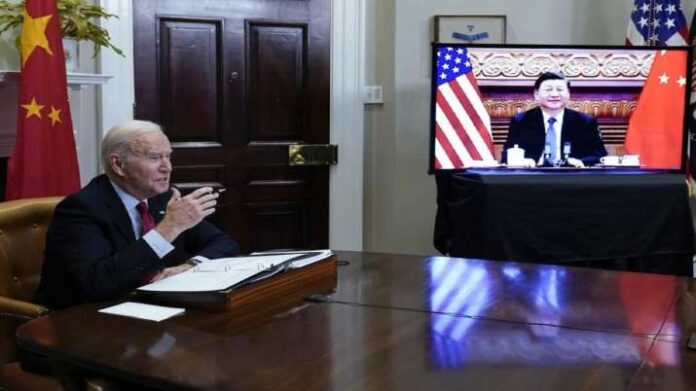| Translate This News In |
|---|
President Joe Biden and Chinese President Xi Jinping spent more than two hours on Thursday (July 28) discussing the future of their delicate relationship, with Taiwan surfacing as a prominent bone of contention once again.
According to an overview of the call given by Beijing, Xi reiterated China’s claim over the island, which has ruled itself for decades.
“Those who play with fire will perish by it,” stated the Ministry of Foreign Affairs.
“It is hoped that the United States will be clear-eyed about this.””
The White House published its own account of the Taiwan talk, stating that Biden “emphasised that the US position has not changed and that the US strongly opposes unilateral moves to change the status quo or threaten peace and stability across the Taiwan Strait.”
The White House stated that the purpose of the conversation, which began at 8:33 a.m. EDT and lasted at 10:50 a.m. EDT, was to “responsibly manage our differences and work together when our interests match.”
As is customary, China made it clear that it blames the United States for the deterioration of relations between the two countries.
“President Xi emphasised that approaching and defining China-US relations in terms of strategic competition, and viewing China as the primary rival and the most serious long-term challenge, would misperceive China-US relations and misread China’s development, and would mislead the people of the two countries and the international community,” the Ministry of Foreign Affairs said.
The call occurred as Biden seeks new ways to collaborate with China and limit its global impact. Differing opinions on global health, economic policy, and human rights have long put the relationship to the test, with China’s failure to criticise Russia’s invasion of Ukraine adding to the tension.
The most recent source of tension has been House Speaker Nancy Pelosi’s possible visit to Taiwan, which has a democratic government and receives informal defence support from the US but is considered part of China’s territory. Beijing has stated that such a trip would be viewed as a provocation, a threat that US officials are taking very seriously in light of Russia’s foray into Ukraine.
“If the United States insists on going its own way and attacking China’s bottom line, it will undoubtedly be greeted with harsh responses,” Zhao Lijian, a Foreign Ministry official, warned reporters earlier this week.
There are subjects where we can collaborate with China, and there are issues where there is clearly friction and strain.”
Biden and Xi last spoke in March, shortly after Russia invaded Ukraine.
Biden has taken steps to reduce the United States’ reliance on Chinese manufacturing, including the Senate’s adoption of legislation on Wednesday to encourage semiconductor companies to establish more high-tech operations in the United States. Biden wants to rally global democracies to support infrastructure investments in low- and middle-income countries as an alternative to China’s “Belt and Road Initiative,” which aims to increase China’s trade with other global markets.
To keep influence on Beijing, Biden has maintained Trump-era tariffs on several Chinese-made commodities. However, he is considering whether to ease at least some of them in order to reduce the impact of rising inflation on American people.
US officials have also criticised China’s “zero-COVID” policy of mass testing and lockdowns in an effort to control the spread of COVID-19 in its territory, calling it misguided and concerned that it will further hamper global economic growth.
Other points of contention include China’s treatment of Uyghur Muslims, which the US has labelled genocide, militarization in the South China Sea, and a global campaign of economic and political espionage.


















